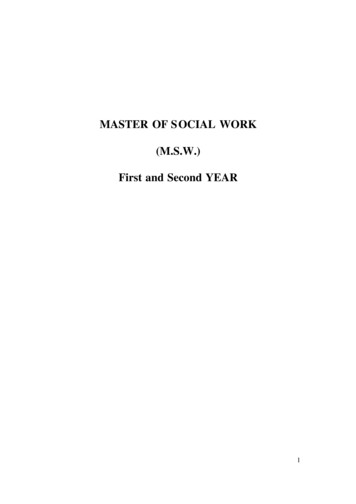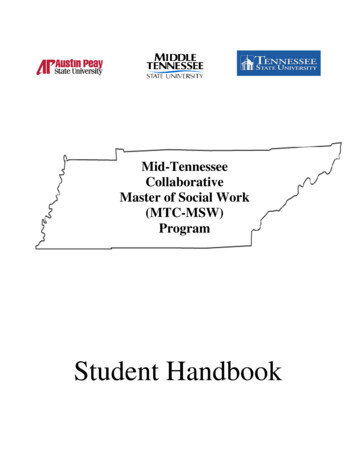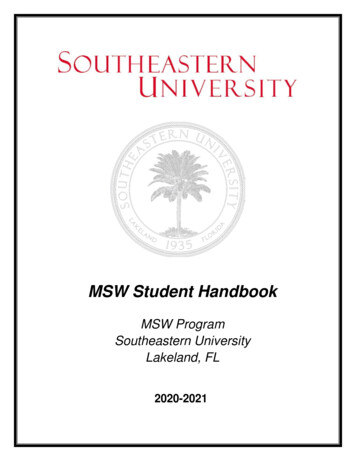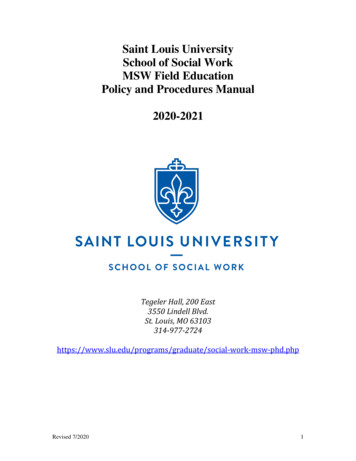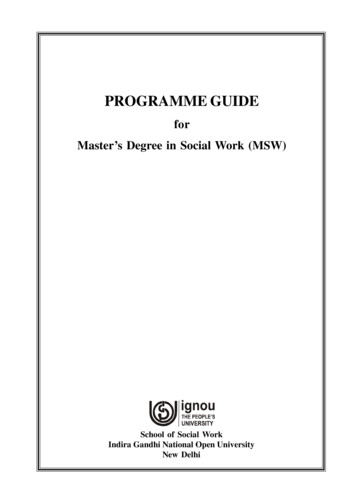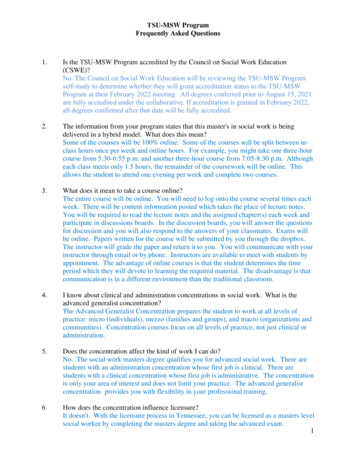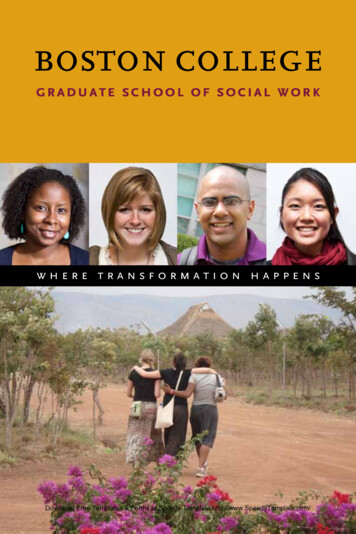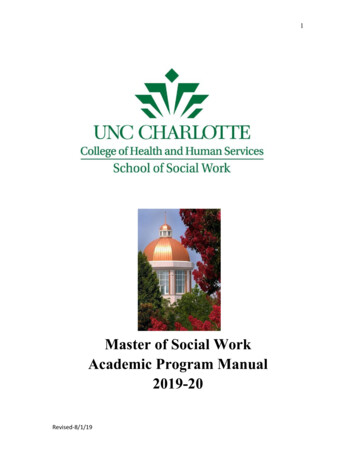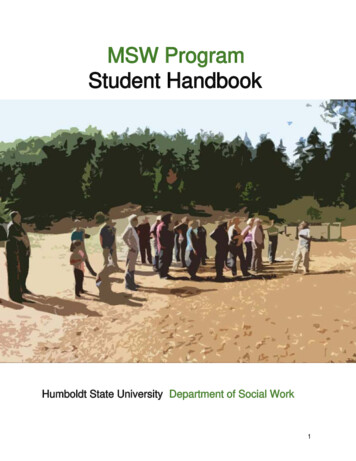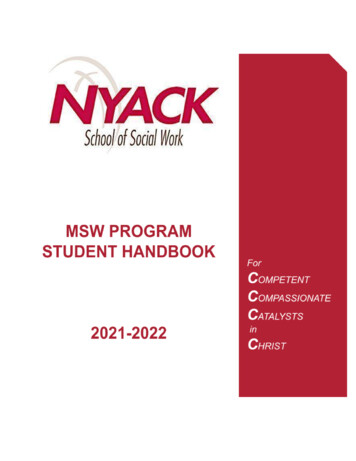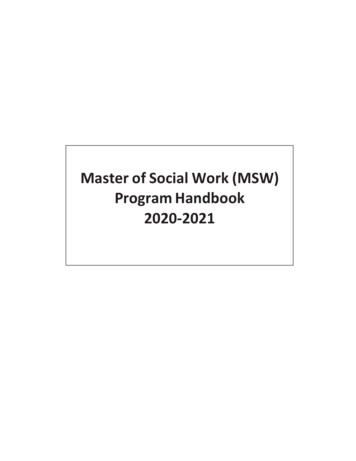
Transcription
Master of Social Work (MSW)Program Handbook2020-2021
ContentsIntroduction . 6Stockton University . 6Administration—Contact Information. 6Emergency Closings . 6Accreditation. 7Faculty . 7Professor Emeritus . 8Professional Staff . 8Equal Opportunity and Affirmative Action, Nondiscrimination . 9The Social Work Profession . 9MSW Program Mission, Goals, Competencies, and Practice Behaviors . 9Mission. 9Goals . 10Competencies and Practice Behaviors . 10Admissions Policies . 18Graduate Assistantships . 18Educational Approaches . 18Curriculum Plan and Graduation Requirements. 18MSW Degree Options . 18Two-Year Full-Time Traditional Program . 19Three-Year Part Time Traditional Program Option . 20Advanced Standing Full-Time Option . 21Masters Child Welfare Education Program (MCWEP) . 21Course Descriptions: Foundation Year Courses. 22SOWK 5101: Human Behavior and the Social Environment I . 22SOWK 5102: Human Behavior and the Social Environment II . 22SOWK 5120: Social Organizations and Environments. 22SOWK 5130: Foundation Social Welfare Policy. 23SOWK 5140: Foundation Social Work Research . 23SOWK 5150: Race, Ethnicity, and Diversity: Implications for Social Work Practice . 23Revised 9-1-20MSW Program HandbookPage 2
SOWK 5601: Foundation Social Work Practice I . 24SOWK 5602: Foundation Social Work Practice II . 24SOWK 5901: Field I . 24SOWK 5902: Field II . 25Course Descriptions: Concentration Year Courses . 26SOWK 5230: Advanced Social Welfare Policy . 26SOWK 5240: Advanced Social Work Research . 26SOWK 5250: Advanced Cultural Competence . 26SOWK 5601: Advanced Social Work Practice with Diverse Individuals, Families, and CommunitiesI . 27SOWK 5604: Advanced Social Work Practice with Diverse Individuals, Families, and CommunitiesII . 27SOWK 5903: Field III . 28SOWK 5904: Field IV . 29Course Descriptions: Electives within the Program . 29SOWK 5512: Clinical Social Work Practice with Groups. 29SOWK 5515: Clinical Social Work in Health Settings . 29SOWK 5528: Psychopathology Using a Competency Based Assessment Model . 30SOWK 5530: Psychopathology, Psychopharmacology, and Cultural Neuroscience. 30SOWK 5532: Suicide Assessment and Intervention . 30SOWK 5535: Substance Abuse: Treatment and Recovery . 31SOWK 5538: Cognitive Behavioral Therapy . 31SOWK 5540: Clinical Gerontological Social Work Practice . 31SOWK 5550: International Social Work . 32SOWK 5552: Child Migration and U.S. Immigration Policy: Faculty Led Program. 32SOWK 5561: Leadership and Management I: Leading and Managing Human ServiceOrganizations . 32SOWK 5562: Leadership and Management II: Supervision and Consultation . 33SOWK 5563: Leadership and Management III: Program Planning, Development, and Funding . 33SOWK 5570: Trauma-Informed Social Work Practice. 34SOWK 5571: Trauma-Informed Child Welfare Practice . 34SOWK 5572: Child Welfare Leadership and Supervision. 34SOWK 5575: Forensic Interviewing of Children . 35Revised 9-1-20MSW Program HandbookPage 3
SOWK 5590: Empowering Groups and Communities for Social Change. 35Electives outside the Program. 35Student Rights . 35Expectations of the Graduate Program of Social Work . 36Professional Behavior . 36Classroom Conduct . 36Attendance and Participation . 36Students with Special Needs . 37Student Health Services . 37Advising . 37Registration. 37Good Academic Standing, Probation, and Dismissal Procedure . 37Remedial Plan Requirement and Approval Process . 38Academic Honesty . 39Other Grounds for Dismissal . 39Professional Program Standards . 39Procedures for Professional Termination or Other Disciplinary Action (i.e., Probation,Suspension) and Due Process Guarantees . 40Professional Performance Review . 40Academic and Professional Standing Committee Composition and Operation . 41Possible Outcomes from Academic and Professional Standing Committee Review . 41Program Procedure for Requesting and Conducting Professional Performance Review . 41Procedure for Appeal of Academic and Professional Standing Committee Review Decision. 42Confidentiality. 43Leave of Absence/Readmission . 43Maintenance of Matriculation . 43Withdrawal from the University . 43Evaluation Procedures . 43Grading System . 43Definition of a Passing Grade in the MSW Program . 44Grade Appeals/Advisory Board on Grades and Standing. 44Withdrawals and Incompletes . 45Revised 9-1-20MSW Program HandbookPage 4
MSW Program Distinction . 45Career Opportunities/Employment Demand . 46Certification and Licensure . 46A Final Word . 47APPENDIX: Curriculum Worksheet . 48Revised 9-1-20MSW Program HandbookPage 5
IntroductionWelcome to Stockton University’s MSW Program! Graduates from this program receive a Master’s inSocial Work (MSW) de gree and a r e prepared to assume professional positions in social agencies,institutions, health facilities, and other organizations. With the value base, knowledge and skills theyobtain through their studies, they are prepared to work with diverse individuals, families, andcommunities in fields of social work practice such as aging, child welfare, families and children,healthcare, or behavioral healthcare. For those who choose to pursue an elective specialization inLeadership and Management, Stockton’s MSW program prepares graduates for supervisory, entrylevel management, and leadership positions. For those who choose to pursue an elective specialization inClinical Social Work, Stockton’s MSW program prepares graduates for direct clinical practice.We wish you success as you work towards your educational and career goals, and we look forwardto getting to know you. In addition to developing a familiarity with the contents of this handbook, youneed to consult regularly with your Advisor/Preceptor to assure that you are making satisfactoryprogress towards your degree.Stockton UniversityStockton University is a coeducational, undergraduate and graduate university of arts, sciences, andprofessional studies. Stockton is the southernmost and the youngest member in New Jersey's statewide, state-supported system of higher education. Administratively, there are seven major academicunits (Schools): Arts and Humanities (ARHU), Business (BUSN), Education (EDUC), Health Sciences(HLTH), Natural Sciences and Mathematics (NAMS), Social and Behavioral Sciences (SOBL), and GeneralStudies (GENS).Administration—Contact InformationThe MSW Program is one component of Stockton’s Social Work Program, which is composed ofbaccalaureate and master’s level programs. The MSW is administratively part of the School of Socialand Behavioral Sciences (SOBL) and is headed by an MSW Program Coordinator. Marissa Levy, Ph.D.; Dean, School of Social and Behavioral SciencesOffice: H 201 (609) 652-4512Marissa.Levy@stockton.edu Robert J. Barney, Ph.D., MSW; MSW Program CoordinatorOffice: G-245 (609) 652-4435Robert.Barney@Stockton.edu Allison Sinanan, Ph.D., MSW; BSW Program CoordinatorOffice: B-116 (609) 626-3561Allison.Sinanan@stockton.eduEmergency ClosingsIn the event of severe weather or other types of emergencies, check the university’s web site forRevised 9-1-20MSW Program HandbookPage 6
information on class cancellations. Area radio stations may also announce the status of theuniversity. The school identification number is 913, or 2913 for evening classes.Students can also subscribe to Stockton’s Emergency Text-Messaging Notification System. Allstudents can now “opt in” to the University’s new emergency text-messaging system, which enables alimited number of campus administrators to send urgent text messages to subscribers’ cell phonesin the event of an emergency. To subscribe, follow the instructions located on this web teID 276&pageID 18AccreditationStockton University's Master of Social Work (MSW) Program is fully accredited by the Council on SocialWork Education (CSWE). The Program was initially accredited in 2012, retroactive to 2009. Itsaccreditation was reaffirmed in 2016 through October 2024.Faculty Robert J. Barney, MSW Program Coordinator, Associate Professor of Social WorkPh.D. (University of Louisville), MSW (University of Kentucky), B.A. (Asbury University)International social work, family and community development, cultural diversity in HIV/AIDSsupport, research practice, human trafficking. Guia Calicdan-Apostle, Associate Professor of Social WorkDSW (University of Pennsylvania), MSW (Asian Social Institute, Philippines), BSW (PhilippineWomen's University)Clinical social work practice, cultural competence, spirituality in mental health, public healthintervention and advocacy (tobacco control), race, ethnicity and diversity issues. Lisa Cox, Professor of Social WorkPh.D., MSW (Virginia Commonwealth University), B.A. (Bridgewater College), LCSWClinical social work practice, psychopathology and cultural neuroscience, health care, HIV/AIDSclinical trials research, gerontology, research methods, linkage between social support andadherence. Matthew DeCarlo, Assistant Professor of Social WorkPh.D. (Virginia Commonwealth University), MSW (George Mason University), BA (College of Williamand Mary)Open education, open access, critical digital pedagogy, self-determination in disability and socialwelfare policy, and harm reduction approaches to substance use. Jennifer Dunkle, Assistant Professor of Social WorkPh.D. (Fordham University), MSW (Monmouth University), B.A. (Marshall University).Diversity and aging, diversity in higher education, social welfare policy, qualitative research,environmental justice, community health and well-being.Revised 9-1-20MSW Program HandbookPage 7
Robin Hernandez-Mekonnen, Associate Professor of Social WorkPh.D., MSW (University of Pennsylvania), B.A. (University of Wisconsin-Madison)Social work with children and families, impacting social and child welfare system reform via researchand policy, immigration, trauma, childhood adversity, child well-being, and mixed-methodsresearch. Loretta Mooney, Assistant Professor of Social WorkPh.D. (Widener University), MSW (University of Maryland at Baltimore), BSW (LaSalle University)Suicidology, mental health management and recovery, civil commitment and coercive practices,support for psychological pain. Jack B. Lewis, Jr., Assistant Professor of Social WorkDSW, MSW (University of Pennsylvania), BA (The Johns Hopkins University), LCSWSocial work practice, cultural competence, cultural humility, micro-aggressions, minority mentalhealth. Maya A. Lewis, Associate Professor of Social WorkPh.D (University of Maryland, Baltimore), MSW (Washington University), B.A. (Spelman College)Human behavior, research methods, social work practice, adolescent mental health, minority health,health disparities, cultural competence.Professor Emeritus Diane S. Falk, Professor Emeritus of Social WorkPh.D. (Rutgers University), MSW (University of Pennsylvania), M.A., B.A. (University ofChicago), LCSWSocial work practice, program development and administration, child welfare, mental healthpractice and policy, human rights, international social work. John W. Searight, Professor Emeritus of Social WorkMSW (University of Pennsylvania), B.A. (Yale University)Social work practice, child welfare (protective services).Professional Staff Joseph Everett, Program Assistant, Child Welfare Education InstituteMSW, BA (The Richard Stockton College of New Jersey)Child welfare, criminal justice, homelessness, program development and administration. Dawn M. Konrady, Director, Child Welfare Education InstituteEdD (Drexel University), MBA (The Richard Stockton College of New Jersey), MA (La Salle University),BS (Susquehanna University)Bilingual/bicultural studies, Spanish language, information systems, leadership in higher education. Kathleen Siracusa, Coordinator of MSW Field EducationMSW (Rutgers University), BA (Boston University), LCSWRevised 9-1-20MSW Program HandbookPage 8
Children and families, ethics, cultural diversity, hospital social work, hospice care, in home therapywith children, school social work, mental health practice. Lori Tomaro, Assistant Coordinator of MSW Field EducationMSW (Monmouth University), BSW (The Richard Stockton College of New Jersey)Child abuse and neglect; impact of infant/childhood relationship traumas and their influence onparenting behaviors; diverse populations; therapeutic services to individuals, couples, and families.Equal Opportunity and Affirmative Action, NondiscriminationStockton University is an equal opportunity university. It does not discriminate in admissions or accessto its programs and activities or in treatment or employment on the basis of race, creed, color,national origin, ancestry, disability, age, sex, affectional or sexual orientation, marital status, liabilityfor service in the Armed Forces of the United States, or nationality.Stockton University is committed to providing every student with an environment free fromdiscrimination or harassment. Under this policy, discrimination/harassment based upon the followingprotected categories are prohibited and will not be tolerated: race, creed, color, national origin,nationality, ancestry, age, sex/gender (including pregnancy), marital status, civil union status,domestic partnership status, familial status, religion, affectional or sexual orientation, gender identityor expression, atypical hereditary cellular or blood trait, genetic information, liability for service inthe Armed Forces of the United States, or disability.1The Social Work Program is fully and enthusiastically committed to all of the above.The Social Work ProfessionSocial work is a profession concerned with conditions that limit the social functioning of individuals,groups, and communities. Its purpose is to enhance client systems’ social functioning and to helpcreate a more just and supportive society for all people. Social work, an academic and professionaldiscipline with an organized body of values, knowledge, and skills, represents a point of view on thehuman condition. It is also an applied practice that is both creative and a source of insight into thatcondition. The problems of people are identified as resulting primarily from environmental andsocietal failure and not from personal pathology. Thus, social work is committed to promoting socialand institutional change in addition to helping people directly in their individual difficulties. In allinstances, social work begins, not with people’s problems, but with their respective strengths.MSW Program Mission, Goals, Competencies, and Practice BehaviorsMissionThe mission of Stockton’s MSW Program is to educate social workers who are prepared for advancedlevel practice with diverse individuals, families, and communities. The Program aims to producegraduates who understand the human condition and the commonalities that all people everywhere1Stockton University. Policy Prohibiting Discrimination in the Workplace. Retrieved on September 3, 2016 ntent/docs/VI-28 021611.pdfRevised 9-1-20MSW Program HandbookPage 9
share, while respecting and honoring differences in personal and communal history, social class, race,color, ethnicity, culture, language, immigration status, gender, sex, sexual orientation, marital status,age, political ideology, religion, and disability status. The curriculum focuses on developing practitionerswho are able creatively to develop an in-depth understanding of diverse worldviews; empower diversepeople to expand their capacities, resources, and opportunities; and advocate for policies and servicesthat address social conditions that limit the quality of life for all people.The Program builds upon a strong foundation of generalist social work practice values, knowledge, andskills. Students are expected to understand and be able to apply an ecosystems perspective, thestrengths perspective, and empowerment practice theory. They develop a thorough acquaintance withthe negative effects of oppression, discrimination, marginalization, and other social forces that blockpeople’s ability to meet their basic human needs. They develop familiarity with multiple theories,perspectives, and approaches that will strengthen their ability to work effectively with diversepopulations. They are expected to critically examine these theories, perspectives, and approaches asthey become acquainted with research literature and as they develop experience in agency practice.Continuing the central focus of the undergraduate program, the MSW Program aims to producegraduates who have a lifetime commitment to upholding human rights, respecting human diversity, andworking towards social justice in their professional and personal lives.GoalsGOAL 1. To prepare graduates for advanced practice with diverse populations, particularly those whohave been placed at risk by patterns and histories of social injustice.GOAL 2. To provide comprehensive content about generalist social work practice.GOAL 3. To provide content about the social contexts of social work practice.GOAL 4. To infuse throughout the curriculum the values and ethics that guide professional socialworkers in their practice, with particular attention to cultural competence standards.GOAL 5. To prepare graduates to be conscientious lifelong learners.GOAL 6. To prepare graduates who demonstrate the ability to think critically, write effectively, usequantitative and qualitative research methods, and be comfortable with the use of computertechnology.GOAL 7. To provide service to the broader university community, to the surrounding southern NewJersey region, and in wider statewide, national, and international arenas. In this way, we deepen theSocial Work Program’s capacity to bring professional values and ethics to the broadest possiblepopulation, representing to students what it means to be engaged professional social workers; and wedemonstrate our commitment to ensure that Stockton University graduates are prepared to be citizensin a democratic, multicultural society.Competencies and Practice BehaviorsFoundation Practice Competencies and BehaviorsRevised 9-1-20MSW Program HandbookPage 10
Competency 1: Demonstrate Ethical and Professional BehaviorSocial workers understand the value base of the profession and its ethical standards, as well as relevantlaws and regulations that may impact practice at the micro, mezzo, and macro levels(knowledge/FPB1).Social workers understand frameworks of ethical decision-making and how to applyprinciples of critical thinking to those frameworks in practice, research, and policy arenas (cognitive andaffective processes/FPB1). Social workers recognize personal values and the distinction betweenpersonal and professional values (values/FPB2). They also understand how their personal experiencesand affective reactions influence their professional judgment and behavior (skills/FPB3). Social workersunderstand the profession’s history, its mission, and the roles and responsibilities of the profession.Social Workers also understand the role of other professions when engaged in inter-professional teams.Social workers recognize the importance of life-long learning and are committed to continually updatingtheir skills to ensure they are relevant and effective (skills/FPB5). Social workers also understandemerging forms of technology and the ethical use of technology in social work practice(knowledge/FPB4). Social workers: C1, FPB1: make ethical decisions by applying the standards of the NASW Code of Ethics, relevantlaws and regulations, models for ethical decision-making, ethical conduct of research, andadditional codes of ethics as appropriate to context; C1, FPB2: use reflection and self-regulation to manage personal values and maintainprofessionalism in practice situations; C1, FPB3: demonstrate professional demeanor in behavior; appearance; and oral, written, andelectronic communication; C1, FPB4: use technology ethically and appropriately to facilitate practice outcomes; and C1, FPB 5: use supervision and consultation to guide professional judgment and behavior.Competency 2: Engage Diversity and Difference in PracticeSocial workers understand how diversity and difference characterize and shape the human experienceand are critical to the formation of identity. The dimensions of diversity are understood as theintersectionality of multiple factors including but not limited to age, class, color, culture, disability andability, ethnicity, gender, gender identity and expression, immigration status, marital status, politicalideology, race, religion/spirituality, sex, sexual orientation, and tribal sovereign status(knowledge/skill/FPB6). Social workers understand that, as a consequence of difference, a person’s lifeexperiences may include oppression, poverty, marginalization, and alienation as well as privilege, power,and acclaim (values/FPB7). Social workers also understand the forms and mechanisms of oppression anddiscrimination and recognize the extent to which a culture’s structures and values, including social,economic, political, and cultural exclusions, may oppress, marginalize, alienate, or create privilege andpower (cognitive and affective processes/FPB8). Social workers: C2, FPB6: apply and communicate understanding of the importance of diversity and differencein shaping life experiences in practice at the micro, mezzo, and macro levels; C2, FPB7: present themselves as learners and engage clients and constituencies as experts oftheir own experiences; and C2, FPB8: apply self-awareness and self-regulation to manage the influence of personal biasesand values in working with diverse clients and constituencies.Revised 9-1-20MSW Program HandbookPage 11
Competency 3: Advance Human Rights and Social, Economic, and Environmental JusticeSocial workers understand that every person regardless of position in society has fundamental humanrights such as freedom, safety, privacy, an adequate standard of living, health care, and education(values/FPB9). Social workers understand the global interconnections of oppression and human rightsviola
Stockton University's Master of Social Work (MSW) Program is fully accredited by the Council on Social Work Education (CSWE). The Program was initially accredited in 2012, retroactive to 2009. Its accreditation was reaffirmed in 2016 through October 2024. Faculty Robert J. Barney, MSW Program Coordinator, Associate Professor of Social Work
